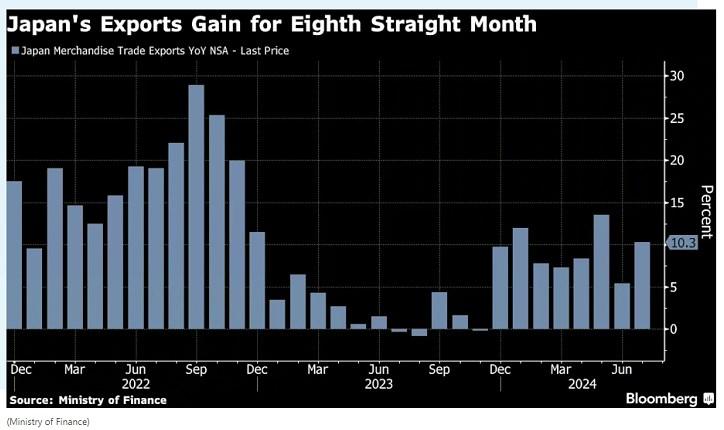Boosted by the depreciation of the Japanese yen, Japan's exports increased significantly in July
Japan's export growth rate accelerated in July, largely reflecting the situation where the yen exchange rate fell to a 38 year low last month.
The Japanese Ministry of Finance reported on Wednesday that exports led by chip components and automobiles increased by 10.3% year-on-year, higher than last month's 5.4%. This result is basically consistent with the median expectation of 11.5% growth by economists.

Figure: Japan's exports continue to grow for the eighth consecutive month (Source: Ministry of Finance of Japan)
Imports increased by 16.6%, higher than analysts' expectations of 14.6%. With the increase in import growth, the trade balance has returned to a deficit of 621.8 billion yen (4.3 billion US dollars).
The Bank of Japan is closely monitoring the economy and financial markets in search of a virtuous cycle, and the recovery of overseas exports is a missing piece for it. The Bank of Japan's interest rate hike on July 31st and Governor Kazuo Ueda's hawkish signals led to a global market crash earlier this month.
I don't think this will have much impact on the Bank of Japan's view that the Japanese economy is recovering moderately, but the biggest factor is the weak yen, "said Takeshi Minami, Chief Economist at Norinchukin Institute
The value of exported goods in July was boosted by the weak yen. The Japanese Ministry of Finance stated that the average exchange rate of the Japanese yen in July was 159.77 yen per US dollar, a year-on-year decrease of 12.3%. Calculated by export volume, exports decreased by 5.2% year-on-year.
The data also shows clearer signs of recovery in automobile exports. Earlier this year, the security certification scandal put pressure on the industry.
On August 1st, Toyota Motor Corporation, the world's largest automaker, reported that its profits had climbed in the most recent quarter due to weak yen and strong demand in North America driving sales. Analysts predict that this Japanese manufacturer will break records in profits this year.
Chisato Oshiba, an economist at Dai Ichi Life Research Institute, said, "Automobile production is recovering, but it has not yet returned to previous levels. In addition, due to the slowdown of overseas economies, demand itself is not strong
Divided by region, Japan's shipments to the United States increased by 7.3%, slightly slowing down from last month. The export growth rate to major Asian countries remained unchanged at 7.2%, while shipments to the European Union decreased by 5.3%.
A report released by the Japanese government last week showed that the Japanese economy recorded its first growth in two quarters from April to June this year, with an annualized growth rate of 3.1%, largely due to a rebound in consumer spending. Due to the fact that the import growth of this resource scarce country exceeds the export growth, the contribution of foreign demand is negative.
Tips:This page came from Internet, which is not standing for FXCUE opinions of this website.
Statement:Contact us if the content violates the law or your rights
